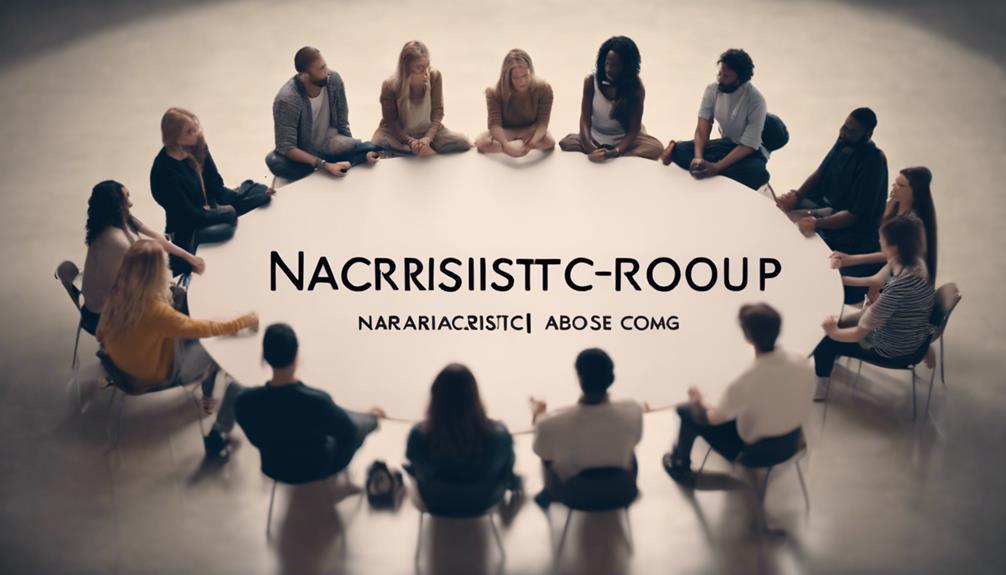Narcissistic Abuse Recovery
How to Navigate Narcissistic Abuse Awareness Month

Exploring Narcissistic Abuse Awareness Month involves understanding abuse dynamics, recognizing signs, seeking support, prioritizing self-care, and setting boundaries with toxic individuals. Acknowledge manipulative tactics, emotional abuse, and gaslighting used by narcissistic abusers. Be aware of red flags like lack of empathy and grandiosity. Seek validation from trusted sources, join support groups, and engage in self-care practices like journaling and therapy. Establish boundaries, communicate limits, and prioritize mental well-being. These steps lay a foundation for effectively navigating Narcissistic Abuse Awareness Month and promoting healing.
Key Takeaways
- Participate in awareness events and share resources for education.
- Engage in self-care practices and seek therapy for healing.
- Join support groups to connect with others and share experiences.
- Advocate for awareness through social media and community involvement.
- Educate yourself on narcissistic abuse dynamics and red flags for prevention.
Understanding Narcissistic Abuse Dynamics
Traversing the treacherous waters of narcissistic abuse dynamics requires a crucial understanding of the manipulative tactics employed by individuals with narcissistic personality disorder. Emotional abuse is a common tool used by the narcissistic abuser, leading survivors of narcissistic abuse to grapple with profound effects on their mental well-being. These manipulation tactics can include gaslighting, where the abuser distorts reality to make the victim doubt their own perceptions, and emotional invalidation, where the survivor's feelings are dismissed or belittled. Understanding these tactics is essential for those seeking to support survivors of narcissistic abuse effectively.
Survivors of narcissistic abuse often struggle with anxiety, PTSD, depression, and low self-worth due to the insidious nature of emotional manipulation. Recognizing the impact of emotional abuse is crucial in offering proper support and guidance to those affected. By educating ourselves on the dynamics of narcissistic abuse, we can better equip ourselves to help survivors navigate the challenging path to healing and reclaiming their sense of self-worth.
Recognizing Signs of Narcissistic Abuse

Recognizing signs of narcissistic abuse requires a keen awareness of subtle manipulative behaviors and emotional red flags within relationships. It's important to pay attention to signs of manipulation, emotional triggers, and feelings of low self-esteem, as these can indicate a toxic dynamic. Here is a table highlighting common signs of narcissistic abuse:
| Signs of Narcissistic Abuse | Description |
|---|---|
| Gaslighting | Manipulative tactic to make you doubt your reality. |
| Lack of Empathy | Inability to understand or share your feelings. |
| Grandiosity | Exaggerated sense of self-importance. |
Seeking Support and Validation

In seeking support and validation during Narcissistic Abuse Awareness Month, it's important to reach out to trusted individuals or professionals who can validate your experiences of narcissistic abuse.
Sharing your story with those who understand and believe you can be a vital step towards healing. Consider confiding in friends, family members, or a therapist who can offer empathy and guidance on your journey.
Additionally, joining online support groups or communities can connect you with others who've faced similar challenges, providing a sense of belonging and understanding.
Attending educational workshops or seminars focused on narcissistic abuse and healing strategies can further enhance your knowledge and coping mechanisms.
Prioritizing Self-Care and Healing

Exploring Narcissistic Abuse Awareness Month involves prioritizing self-care and healing through participating in therapeutic activities and establishing boundaries with toxic individuals. Self-care is essential for our well-being during this month, and engaging in activities like journaling, mindfulness, and meditation can aid in our recovery journey. It's important to set boundaries with toxic individuals to protect ourselves from further harm and seek support from trusted friends or professionals.
| Self-Care Activities | Description |
|---|---|
| Journaling | Expressing thoughts and emotions on paper can help process trauma. |
| Mindfulness | Being present in the moment can reduce anxiety and promote relaxation. |
| Meditation | Practicing mindfulness meditation can improve mental clarity and emotional stability. |
Prioritizing self-care also means participating in support groups or counseling sessions to receive validation and guidance in managing narcissistic abuse. Taking time for self-reflection, self-compassion, and self-love is key to healing from the effects of narcissistic abuse. Remember, putting yourself first is not selfish; it's necessary for your healing journey.
Setting Boundaries With Toxic Individuals

When dealing with toxic individuals, it's important to set clear boundaries to protect yourself and assert your personal space.
Prioritizing self-care and mental well-being is essential in maintaining these boundaries effectively.
Recognizing manipulation tactics and seeking support can help reinforce healthy boundaries and navigate potential resistance from toxic individuals.
Clear Boundaries for Safety
Setting clear boundaries with toxic individuals is essential for safeguarding our emotional well-being and mental health. When dealing with narcissistic abuse, it's vital to recognize red flags indicating manipulative behavior. Clearly communicate your boundaries and the consequences for violations to maintain a sense of safety and control in interactions.
Adjust your boundaries accordingly if you notice patterns of abuse or manipulation. Prioritize self-care and prioritize your needs to avoid falling victim to gaslighting or emotional manipulation. Seeking support from trusted friends, family, or professionals can reinforce your boundaries and provide emotional validation during Narcissistic Abuse Awareness Month.
Asserting Personal Space
Asserting personal space with toxic individuals is an essential step in safeguarding our emotional well-being and maintaining healthy boundaries.
When setting boundaries, clearly communicate limits and consequences for crossing them to protect your personal space. It's imperative to recognize manipulative tactics used by narcissists to violate these boundaries and remain firm in enforcing them.
Practicing self-care is essential; prioritize your own needs when dealing with toxic individuals to prevent emotional drain. Seek support from trusted friends, family, or professionals to reinforce boundaries and effectively navigate narcissistic abuse.
Spreading Awareness and Advocacy

Let's kickstart our efforts to raise awareness about narcissistic abuse by actively engaging in online campaigns and sharing valuable resources on social media platforms. During Narcissistic Abuse Awareness Month, participating in online campaigns with hashtags like #IfMyWoundsWereVisible can help spread awareness and start important conversations. By sharing educational resources, articles, and personal stories online, we can educate others about the signs and effects of narcissistic abuse. Joining support groups or attending events focused on this issue can provide further insight and support for both survivors and advocates.
Advocacy plays an essential role in combating narcissistic abuse. Consider advocating for policy changes or supporting organizations dedicated to addressing and preventing this form of abuse in communities. Engaging in conversations with friends, family, and colleagues can also promote understanding and empathy towards survivors. By working together to spread awareness and advocate for change, we can create a more informed and supportive environment for those affected by narcissistic abuse.
Frequently Asked Questions
What Words Can Destroy a Narcissist?
Using assertive language can be effective in challenging a narcissist's control. Words like 'No,' 'I disagree,' and 'I won't tolerate that behavior' can disrupt their manipulative tactics.
Setting clear boundaries and refusing to engage in gaslighting can undermine their power over us.
Calling out lies and seeking support from therapists or groups can expose their deceitful behavior and provide strategies for coping with their abuse.
How Do You Break the Cycle of Narcissistic Abuse?
Breaking the cycle of narcissistic abuse involves recognizing the signs, seeking support, and setting boundaries.
We prioritize self-care and educate ourselves on narcissistic tactics to empower our healing journey.
By practicing self-compassion and enforcing boundaries, we protect our mental well-being.
Seeking therapy, support groups, and trusted individuals aids in breaking free from the abusive cycle.
It's essential to prioritize our needs and stay informed to navigate the recovery process effectively.
What Are the 4 Cycles of Narcissistic Abuse?
The four cycles of narcissistic abuse are idealization, devaluation, discard, and hoovering.
In the idealization phase, the narcissist presents themselves as perfect and showers the victim with love.
Then, in the devaluation phase, they start to criticize and devalue the victim.
Next comes the discard phase, where the narcissist may abruptly end the relationship.
What Not to Say to Victims of Narcissistic Abuse?
When supporting victims of narcissistic abuse, it's essential to avoid phrases that belittle their pain or shift blame. Phrases like 'just leave' or 'it can't be that bad' oversimplify their struggles. Never imply they provoked the abuse or question their reality.
Healing takes time and support, so refrain from minimizing their trauma by saying 'forget about it.' Compassion and validation are key in helping victims navigate their difficult journey towards healing.
Conclusion
To sum up, participating in Narcissistic Abuse Awareness Month requires understanding the dynamics of abuse, recognizing the signs, seeking support, prioritizing self-care, setting boundaries, and spreading awareness.
One interesting statistic to note is that 75% of narcissistic abusers are male, highlighting the prevalence of this issue in society.
By educating ourselves and others, we can work towards creating a safer and healthier environment for all. Stay informed, seek help, and remember that you aren't alone in this journey.
Narcissistic Abuse Recovery
Can You Help a Narcissistic Abuser Change?

Helping a narcissistic abuser change requires self-awareness, therapy, accountability, and a commitment to personal growth. Therapies such as CBT or DBT can be beneficial for personal development. Establishing boundaries, clear communication, and seeking support are important for creating healthy relationships. Recognizing manipulative behaviors is crucial, and receiving support from therapists or groups can offer coping strategies. Education on narcissistic patterns is a key aspect of the process. Implementing consequences, taking accountability, and receiving feedback are essential for facilitating change. While overcoming deeply ingrained beliefs is challenging, it is possible with dedication. Embracing vulnerability, seeking assistance, and acknowledging progress are all important for fostering growth. Our comprehensive guide provides valuable insights for aiding narcissistic abusers in their journey towards change.
Key Takeaways
- Self-awareness and willingness to engage in therapy are crucial.
- Acknowledgment of abusive behavior is essential for change.
- Commitment to therapy and willingness to change are key.
- Therapy options like CBT and DBT can facilitate improvement.
- Support systems and professionals play a vital role in transformation.
Understanding Narcissistic Abuse Behavior
When dealing with narcissistic abuse behavior, recognizing the manipulation tactics employed by the abuser is vital. Abusers with narcissistic traits often engage in gaslighting, denial of abuse, and reacting with disproportionate anger. They use insults, profanities, and belittling tactics to exert control over their victims. This behavior can have severe effects on mental health, leaving victims feeling isolated, powerless, and traumatized. The abuse, whether verbal, emotional, psychological, or physical, can lead to long-term consequences impacting the victim's well-being.
Understanding narcissistic abuse behavior is essential in identifying the signs early on. By being aware of these manipulation tactics, individuals can set boundaries, seek support, and prioritize self-care. Recognizing the harmful effects of such behavior is the first step towards protecting oneself and seeking help. By acknowledging the impact on mental health, individuals can begin to break free from the cycle of abuse and work towards healing and recovery.
Factors Influencing Abuser Change

When considering the factors that influence a narcissistic abuser's ability to change, it's essential to evaluate their self-awareness and willingness to engage in therapy.
The severity of their narcissistic traits and the presence of any co-occurring conditions can also impact the potential for transformation.
Ultimately, the abuser's internal motivation for change and the support they receive from mental health professionals are pivotal elements in facilitating lasting progress.
Factors for Change
Factors influencing the potential for change in a narcissistic abuser include acknowledgment of abusive behavior, willingness to change, severity of narcissistic traits, self-awareness, motivation, and commitment to therapy.
For a narcissistic abuser to transform, it's essential for them to recognize their harmful actions and have a genuine desire to change. The depth of their narcissistic traits, level of self-awareness, and the drive to improve also impact their ability to transform.
By actively participating in therapy and addressing underlying issues, a narcissistic abuser can make progress towards change. Long-term improvement requires consistent effort, self-reflection, and a commitment to personal growth.
Encouraging a narcissistic abuser to seek therapy and engage in the process can pave the way for positive change in their behavior.
Barriers to Improvement
Recognizing and addressing barriers to improvement is essential in facilitating change for a narcissistic abuser. When dealing with individuals exhibiting narcissistic tendencies, several factors can impede progress towards positive change:
- Denial of problematic behavior: Abusers may struggle to recognize their actions as harmful, hindering self-reflection.
- Resistance to therapy: A common barrier is the abuser's unwillingness to engage in therapeutic interventions that could promote growth.
- Lack of empathy: Limited capacity to understand others' perspectives can prevent meaningful change and connection.
- Manipulative tactics: Strategies like gaslighting and blame-shifting can hinder personal accountability and perpetuate harmful behaviors.
Therapy Options for Narcissistic Abusers

When considering therapy options for narcissistic abusers, it's important to explore various approaches like Cognitive Behavioral Therapy (CBT), Schema Therapy, and Dialectical Behavior Therapy (DBT). These methods can help address symptoms, increase self-awareness, and promote personal growth.
It's vital to tailor the therapy to the individual needs of the narcissistic abuser to effectively navigate the challenges they may face in treatment.
Therapy Approaches Available
Various therapy approaches, such as Schema Therapy, Dialectical Behavior Therapy (DBT), and Psychodynamic Psychotherapy, are available for narcissistic abusers seeking to change their behavior. These therapeutic options focus on identifying maladaptive schemas, emotional regulation, and unconscious processes specific to narcissistic personality disorder (NPD).
Tailored therapeutic approaches address the challenges unique to individuals with NPD. Group therapy can offer valuable insights and support for narcissistic abusers in their journey towards change. Cognitive Behavioral Therapy (CBT) is commonly used to manage symptoms and promote personal growth.
Each of these approaches plays an essential role in helping narcissistic abusers understand themselves better and develop healthier ways of interacting with the world around them.
Success Rates in Treatment
Success rates in treating narcissistic abusers can vary, showing improvement in managing symptoms through therapy for some individuals. Therapeutic options like Cognitive Behavioral Therapy (CBT), Schema Therapy, and Dialectical Behavior Therapy (DBT) have been effective in helping narcissistic abusers address maladaptive behaviors, modify negative core beliefs, regulate emotions, and improve interpersonal skills.
While not all narcissistic abusers may seek or benefit from therapy, those willing to change and commit to treatment may experience positive outcomes in managing their behaviors. It's essential to approach therapy with an open mind and a willingness to engage in the process to see potential improvements.
Seeking help and staying dedicated to the therapeutic journey can lead to progress in managing narcissistic tendencies.
Challenges in Therapy
Handling therapy with narcissistic abusers poses significant challenges due to their inherent resistance towards acknowledging faults or seeking assistance. When working with these individuals, therapists encounter obstacles such as:
- Limited self-awareness: Narcissistic abusers often struggle to recognize their problematic behaviors.
- Defensive mechanisms: They may deflect blame or become hostile when confronted with their actions.
- Lack of empathy: Difficulty understanding or considering the feelings of others hinders progress in therapy.
- Resistance to change: Narcissistic traits are deeply ingrained, making it hard for abusers to commit to transformation.
Despite these challenges, tailored therapeutic strategies like Transference-Focused Therapy and Schema Therapy offer hope in addressing narcissistic tendencies, emphasizing self-awareness, empathy, and behavior management.
Importance of Self-Reflection

Engaging in self-reflection is a pivotal step for a narcissistic abuser to acknowledge and address their harmful behavior patterns. Self-reflection involves taking a deep look within oneself, examining how actions and words affect those around them. By encouraging a narcissistic abuser to engage in self-reflection, we can help them develop a greater sense of self-awareness and empathy towards their victims. This introspective process may lead to accountability for their actions and open the door to potential change.
Without self-reflection, the chances of a narcissistic abuser altering their behavior greatly decrease. It's through this internal examination that they can begin to recognize the impact of their actions and words on others. By fostering a culture of self-reflection, we can create opportunities for personal growth and transformation. Encouraging a narcissistic abuser to reflect on their behavior is a compassionate way to support them in their journey towards positive change.
Building Healthy Relationship Dynamics

To cultivate healthy relationship dynamics with a narcissistic abuser, it's essential to establish clear boundaries and expectations. Here are some key strategies to promote healthier interactions:
- Communication Techniques: Utilize assertiveness and active listening skills to navigate conversations effectively and express needs clearly.
- Identifying Manipulative Behavior: Recognize tactics like gaslighting and blame-shifting, and address them to prevent manipulation from undermining the relationship.
- Seeking Support: Engage with therapists or support groups to gain insights on coping mechanisms and strategies for managing a relationship with a narcissistic individual.
- Educational Resources: Learn about narcissistic behavior patterns and seek professional guidance to create a balanced and safe environment for both parties.
Boundaries and Accountability in Change

Managing boundaries and ensuring accountability play pivotal roles in fostering transformation within a narcissistic abuser. Setting clear boundaries is essential as it helps the abuser understand limits and acceptable behavior. This clarity provides a framework for change and aids in establishing healthier relationship dynamics.
Additionally, holding the abuser accountable for their actions is vital. By acknowledging the impact of their behavior and taking responsibility, the abuser can begin the journey towards personal growth. Establishing consequences for boundary violations reinforces the importance of respect and mutual understanding.
Encouraging self-reflection and accountability empowers the abuser to confront their actions and make positive changes. Providing consistent feedback and reinforcement of positive behaviors supports the abuser's progress and reinforces desirable outcomes. By incorporating these strategies, we can create a supportive environment that nurtures the transformation of the narcissistic abuser.
Support Systems for Abusers

Utilizing therapy, counseling, and support groups can form essential support systems for abusers seeking transformation. These resources provide a safe space for narcissistic abusers to explore their behaviors, emotions, and patterns of relating to others. Here are some ways in which support systems can aid in the rehabilitation of narcissistic abusers:
- Professional Guidance: Therapists and counselors can offer specialized interventions to help abusers understand the root causes of their behavior and develop healthier coping mechanisms.
- Educational Opportunities: Support groups and workshops can provide education on abusive behavior, empathy-building, and effective communication skills.
- Accountability: By holding abusers accountable for their actions within a supportive environment, they're more likely to confront their behavior and work towards change.
- Setting Boundaries: Establishing clear boundaries and consequences within these support systems can help abusers recognize and respect limits, fostering a safer and more constructive environment for growth and transformation.
Challenges in Abuser Rehabilitation

Addressing the deeply ingrained beliefs and behaviors of narcissistic abusers presents significant challenges in the rehabilitation process. These individuals often struggle with admitting faults, lack empathy, and exhibit manipulative tendencies. Their sense of entitlement can hinder efforts to promote change and foster healthier behaviors.
Overcoming these ingrained abusive patterns requires a high level of self-awareness and a genuine commitment to therapy, aspects that many abusers may find challenging. Treatment for narcissistic abusers typically involves delving into underlying issues such as insecurity, fear of rejection, and distorted self-image to facilitate lasting change. The success of rehabilitating narcissistic abusers hinges on their willingness to confront their abusive behaviors, actively seek help, and engage in therapy wholeheartedly.
This process can be especially difficult due to the nature of personality disorders and the deep-rooted beliefs that often accompany them. Managing these challenges in abuser rehabilitation requires patience, persistence, and a thorough understanding of the complexities involved in promoting genuine change.
Commitment to Personal Growth

To commence on a journey of personal growth, individuals must first acknowledge their narcissistic behaviors and patterns. This self-awareness is the foundation upon which a commitment to change can be built. Transforming into a healthier, more empathetic individual capable of fostering meaningful relationships requires dedication and effort.
Here are four essential steps to support a narcissist in their commitment to personal growth:
- Embrace Vulnerability: Encourage the narcissist to explore and understand their emotions, fostering empathy and connection with others.
- Seek Professional Help: Suggest therapy or counseling to investigate the root causes of narcissistic tendencies and develop coping strategies.
- Practice Active Listening: Cultivate the skill of truly hearing and understanding others, promoting healthier communication and relationship dynamics.
- Celebrate Progress: Acknowledge and celebrate small victories along the journey, reinforcing positive changes and encouraging continued growth towards healthier relationships.
Frequently Asked Questions
Can You Help a Narcissist Change?
Yes, we can help a narcissist change through therapy, support, and promoting self-awareness. It requires the individual's commitment to acknowledge harmful behaviors and work towards personal growth. Encouraging new coping mechanisms and healthier relationships is essential.
Progress may be gradual, but with dedication, change is possible. Empathy and willingness play key roles in fostering positive transformations in narcissistic abusers.
Can You Have a Healthy Relationship With a Narcissist?
Having a healthy relationship with a narcissist can be challenging due to their traits like lack of empathy and manipulation. It's important to set clear boundaries and prioritize self-care when handling such dynamics.
Understanding the nuances of narcissistic behavior is key to managing and potentially improving the relationship. Seeking support from others and focusing on self-care are essential when dealing with a narcissistic partner.
How Do You Stop a Narcissist From Attacking You?
When dealing with a narcissist's attacks, setting clear boundaries and enforcing consequences is essential. Avoid power struggles and seek support from a therapist or support group for coping strategies.
Document instances of abuse and prioritize your safety. Remember, you deserve to be safe and protected.
Is it possible for a narcissistic abuser to change their behavior and stop causing brain damage?
Reversing brain damage from abuse is a complex issue, especially when it comes to a narcissistic abuser. While change is possible, it requires deep self-reflection and a willingness to seek professional help. With therapy and commitment, some abusers can learn to break their harmful patterns and stop causing lasting damage.
Conclusion
To sum up, while transforming a narcissistic abuser may seem challenging, it's possible with dedication and commitment.
By understanding the root causes of their behavior, seeking therapy, practicing self-reflection, and establishing healthy boundaries, abusers can work towards personal growth and healthier relationship dynamics.
It won't be easy, but with the right support systems in place, change is achievable.
It's a demanding journey, but one that can lead to positive transformation and improved well-being for all involved.
Narcissistic Abuse Recovery
Where to Find Support Groups for Narcissistic Abuse

When searching for support groups for narcissistic abuse, consider online platforms, local centers, therapist referrals, social networks, and nonprofit organizations. Online groups provide a virtual community for sharing experiences. Local centers offer welcoming spaces with customized activities. Therapist referrals connect individuals to trauma recovery experts. Social media networks host discussions and provide valuable resources. Nonprofits establish safe environments for survivors to express themselves. Exploring these options can aid in your healing journey, providing crucial resources and connections.
Key Takeaways
- Online Support Group Platforms offer virtual spaces for survivors to connect and share experiences.
- Local Community Centers provide safe environments with trained facilitators for healing.
- Therapist Referrals connect survivors with specialized professionals for tailored treatment plans.
- Social Media Support Networks offer 24/7 understanding and support from a global community.
- Nonprofit Organizations create safe spaces for survivors to express themselves and promote recovery.
Online Support Group Platforms
Online support group platforms provide a virtual space for survivors of narcissistic abuse to connect and share their experiences. These platforms offer a sense of community and understanding, fostering support among individuals who've faced similar challenges. Through online support groups, participants can find comfort in knowing they aren't alone in their struggles. The support gained from these platforms can be vital in the healing process, providing validation and empathy essential for recovery.
Virtual support groups are accessible from anywhere, making them convenient for individuals in different locations. Whether through forums, video calls, or chat features, participants can engage with others, offering and receiving support in real-time. Additionally, designated moderators or facilitators often oversee these groups, ensuring a safe and respectful environment for all members. This structure helps maintain the focus on support and guarantees that interactions remain constructive and beneficial for everyone involved.
Local Community Centers

Local community centers play an essential role in providing support groups for survivors of narcissistic abuse. These centers often host support groups that offer a safe and welcoming space for individuals seeking healing from the effects of narcissistic abuse. By joining these support groups, survivors can connect with others who've had similar experiences, fostering a sense of understanding and community.
At community centers, survivors of narcissistic abuse can access a variety of resources and activities tailored to support their healing journey. These support groups may be led by trained facilitators or mental health professionals who can offer guidance and support throughout the process. Additionally, the supportive environment created within these groups can empower survivors to share their stories, express their emotions, and learn coping strategies to navigate the challenges they may face.
Therapist Referrals

Utilizing therapist referrals can connect survivors of narcissistic abuse with specialized professionals trained in trauma recovery and healing. These referrals offer an essential link to therapists who can provide tailored treatment plans to address the unique needs of narcissistic abuse survivors. By seeking referrals from trusted sources or mental health organizations, individuals can guarantee they receive quality care from therapists experienced in supporting those who've endured such trauma.
Therapist referrals play a pivotal role in helping survivors process and overcome the effects of narcissistic abuse. These professionals offer a safe and supportive environment for individuals to explore their experiences, heal from past wounds, and develop coping strategies for moving forward. Whether through individual therapy or group sessions, therapists can guide survivors on a path towards healing and empowerment. Seeking therapist referrals is a necessary step in accessing the specialized help needed to navigate the complexities of narcissistic abuse recovery.
Social Media Support Networks

Numerous social media support groups cater to narcissistic abuse survivors, providing a virtual space for connection, sharing experiences, and seeking advice. These online networks, dedicated to Life After Narcissistic abuse, offer a 24/7 haven where individuals can find understanding and support from a global community. Moderated by designated individuals, these groups guarantee a safe and respectful environment for all members.
Within these groups, survivors can engage in online discussions, access valuable resources, and participate in live chats that offer immediate validation and support. Social media platforms like Facebook and Instagram host these support groups, making it convenient for individuals to join and benefit from the collective wisdom and empathy of others who've walked similar paths.
Whether seeking guidance, sharing stories, or simply finding solace in knowing you're not alone, these online support networks play a significant role in the healing journey of narcissistic abuse survivors.
Nonprofit Organizations

Nonprofit organizations like MyNARA offer essential support groups for victims of narcissistic abuse, fostering a safe and understanding environment for survivors to share their experiences. These organizations play a pivotal role in providing a supportive community for individuals who've endured narcissistic abuse.
Here are some key benefits of seeking support from nonprofit organizations:
- Trained Facilitators: Nonprofit support groups often have facilitators who are trained to guide discussions and provide valuable resources to participants.
- Safe Environment: These organizations prioritize creating a safe space where survivors can express themselves without fear of judgment.
- Online Sessions: Some nonprofit support groups offer online meetings, making it convenient for those unable to attend in-person gatherings.
- Empowerment Focus: Organizations like MyNARA focus on empowering survivors and aiding in the healing process after experiencing narcissistic abuse.
- Healing Promotion: Nonprofit support groups aim to promote healing and recovery from the effects of narcissistic abuse through various therapeutic approaches.
Frequently Asked Questions
Is There a Support Group for People in Relationship With Narcissist?
Yes, there are support groups for individuals in relationships with narcissists. These groups offer a safe environment to share experiences, gain insights, and receive validation. Participants learn coping strategies, boundary setting, and self-care practices.
Connecting with others facing similar challenges can reduce isolation and promote healing. Joining a support group empowers individuals to recognize red flags, establish boundaries, and prioritize their well-being in toxic relationships.
What Organization Helps Victims of Narcissistic Abuse?
We support victims of narcissistic abuse by offering a safe space for sharing experiences and connecting with others. MyNARA provides online forums, helplines, therapy, counseling, and legal aid assistance for protection orders.
Educating oneself about narcissistic abuse is empowering and essential for healing. Our organization is dedicated to helping survivors navigate the complexities of abuse and find the support they need to heal and move forward.
Is There a Free Recovery Program for Narcissistic Abuse?
Yes, there are free recovery programs available for narcissistic abuse. Community organizations, online resources, and some support groups offer complimentary services to survivors seeking healing. Nonprofit organizations and mental health centers also provide free support programs.
Online platforms like forums and virtual groups can offer resources for recovery. Local community centers or churches may host free support groups for those affected by narcissistic abuse. Researching these options can help in finding suitable support.
How Do I Find Myself After Narcissistic Abuse?
When trying to find yourself after narcissistic abuse, it's vital to engage in self-reflection and seek therapy. By processing the trauma and rebuilding self-esteem, we can gradually rediscover our identity.
It's important to practice self-compassion, self-care, and explore new hobbies to nurture our emotional well-being and reconnect with our authentic selves.
Additionally, connecting with support groups or communities can provide validation, understanding, and healing during the recovery process.
Can Watching Movies about Narcissistic Abuse Help Me Find Support Groups?
Yes, watching movies about narcissistic abuse can help you find support groups. These movies often depict the reality of the abuse and can lead you to seek out communities of others who have experienced similar situations. They can provide validation and comfort in knowing you are not alone.
Conclusion
To sum up, whether you seek support online, in your local community, through professional referrals, or social media networks, help is available for those affected by narcissistic abuse.
By connecting with others who've experienced similar struggles, you can find validation, understanding, and guidance on your healing journey.
Remember, you aren't alone in this process. Reach out and take advantage of the resources at your disposal to begin your path towards healing and recovery.
Narcissistic Abuse Recovery
Navigating Legal Options for Laws Against Narcissistic Abuse

Understanding legal options for laws against narcissistic abuse involves recognizing key definitions, documenting abuse meticulously, seeking specialized legal aid, addressing gaslighting tactics, prioritizing self-care, and seeking protection through support networks. Exploring these avenues can provide victims with valuable assistance and remedies necessary for managing the complexities of legal processes in cases of narcissistic abuse. Each step outlined offers essential guidance and support to help individuals facing such challenges. These strategic measures can help victims assert their rights and protect themselves effectively in the face of abusive behavior. The holistic approach outlined can provide valuable insights to enhance one’s ability to address narcissistic abuse legally.
Key Takeaways
- Seek legal assistance from lawyers experienced in narcissistic abuse cases.
- Document abuse incidents meticulously with dates, times, and details.
- Secure evidence like text messages, emails, and witness statements.
- Utilize protection orders and therapy services for support and relief.
- Rely on support networks and specialized legal consultations for guidance.
Legal Definitions and Narcissistic Abuse
In understanding legal definitions of narcissistic abuse, we gain insight into identifying abusive behaviors and accessing legal remedies. Emotional manipulation, control tactics, and exploitation are key components of narcissistic abuse that can be addressed through existing laws on domestic violence, harassment, and emotional abuse. Recognizing these behaviors is important for individuals to protect themselves and seek justice within the legal system. Support networks play a crucial role in helping victims navigate the complexities of legal definitions and procedures. By connecting with advocates, counselors, and legal professionals, individuals can find the assistance needed to address narcissistic abuse effectively.
Understanding the legal frameworks that define the boundaries of acceptable behavior is essential for victims to assert their rights and seek recourse. Courts play a significant role in interpreting legal definitions of abuse to promote fair proceedings and protect individuals from further harm. By educating ourselves on these definitions and seeking support from appropriate channels, we empower ourselves to address narcissistic abuse within the legal system effectively.
Documenting Abuse and Gathering Evidence

To effectively address narcissistic abuse within the legal system, meticulous documentation of the abuse and gathering of substantial evidence are essential steps in building a strong case.
Documenting abuse involves maintaining a detailed journal with specific dates, times, and descriptions of incidents. Additionally, saving text messages, emails, and voicemails that provide evidence of manipulation is pivotal for gathering evidence.
Witness statements from individuals who've observed the abuse can further bolster the case. By compiling a thorough collection of evidence, the chances of proving narcissistic abuse in legal proceedings greatly increase.
This evidence not only supports legal claims but also helps establish a clear pattern of abuse, which is critical for a successful case. Remember, thorough documentation and evidence gathering are foundational elements in pursuing justice against narcissistic abuse through legal channels.
Seeking Legal Assistance and Remedies

When confronting narcissistic abuse, it's vital to contemplate seeking legal assistance and remedies. Engaging with experienced lawyers who specialize in these cases can offer valuable guidance and support.
Exploring available legal remedies and seeking professional guidance can be essential steps in successfully maneuvering through the legal system.
Legal Consultation Options
Exploring specialized legal consultation options tailored to narcissistic abuse cases can provide victims with essential guidance and support in maneuvering the legal system effectively. Seeking legal assistance from lawyers experienced in handling abuse cases is vital for victims to understand their rights and explore available remedies.
These legal professionals can offer valuable insights into protection orders, documentation of abuse incidents, and other avenues for seeking justice. Additionally, combining legal consultations with professional counseling and support groups can create a holistic approach to addressing narcissistic abuse.
Available Legal Remedies
Victims of narcissistic abuse have access to legal remedies, including seeking assistance from experienced lawyers specializing in abuse cases to navigate the complex legal system effectively.
Protection orders can provide immediate relief and safety. Therapy and counseling services are pivotal for support during legal proceedings.
Support groups offer a sense of community, understanding, and validation for individuals facing narcissistic abuse in legal contexts. Collaborating with legal experts can strengthen the case and empower victims to assert their legal rights.
Building a strong support system is essential to navigate the challenges of seeking legal remedies for narcissistic abuse. By utilizing available resources and professional guidance, victims can work towards justice and healing.
Seeking Professional Guidance
Understanding the complexities of legal options in cases of narcissistic abuse necessitates seeking professional guidance, particularly through securing legal assistance and remedies to address the challenges effectively. Seeking legal assistance is important for managing the emotional and psychological impacts of narcissistic abuse.
When victims seek legal help, they can explore remedies like protection orders that offer immediate relief. Collaborating with legal experts specializing in abuse cases can provide a deeper understanding of one's legal rights and options, empowering victims to take action.
Additionally, legal support networks and counseling services play an essential role in aiding victims of narcissistic abuse through the legal process.
Addressing Gaslighting and Smear Campaigns

When addressing gaslighting and smear campaigns in cases of narcissistic abuse, it's important to prioritize setting clear boundaries and seeking external validation.
Gaslighting, a manipulative tactic that causes victims to doubt their perceptions and reality, can lead to confusion, self-doubt, and a loss of confidence. Victims often experience emotional distress, anxiety, and isolation due to this form of psychological abuse.
On the other hand, smear campaigns involve spreading false information to discredit victims and maintain control over them.
To address gaslighting and smear campaigns effectively, individuals must establish firm boundaries to protect themselves from further manipulation. Seeking validation from trusted sources can help reaffirm one's reality and counteract the effects of gaslighting. Additionally, practicing self-care is essential in combating the emotional toll of these abusive tactics.
Importance of Self-Care in Legal Processes

Self-care during legal processes is vital for maintaining our well-being and emotional resilience. By participating in activities like therapy, mindfulness, and setting boundaries, we can support our mental health amidst legal battles.
Prioritizing self-compassion and surrounding ourselves with a strong support network are essential components in managing the challenges of legal proceedings related to narcissistic abuse.
Self-Care During Trials
Regularly prioritizing self-care during legal trials is essential for maintaining emotional well-being and clarity. Here are some key practices to keep in mind:
- Taking breaks to rest and recharge.
- Practicing mindfulness to stay present and reduce anxiety.
- Seeking support from friends, family, or a therapist.
- Engaging in physical exercise to release tension and improve mood.
- Using relaxation techniques like deep breathing or meditation to promote calmness.
Legal Battles and Well-Being
Managing legal battles against narcissistic abuse requires actively prioritizing well-being and resilience through self-care practices. In narcissistic abuse cases, maintaining mental well-being is vital to navigate the legal process effectively.
Engaging in self-care activities like therapy, mindfulness, and support groups can help alleviate the stress that often accompanies legal proceedings. By balancing the demands of legal battles with self-care practices, individuals can enhance their clarity, focus, and overall well-being.
Seeking support from professionals and loved ones while practicing self-care can lead to a more empowered and resilient approach to handling the challenges of legal battles. Prioritizing mental health and self-compassion is essential for individuals to effectively manage the complexities of legal processes in cases of narcissistic abuse.
Healing Amidst Legalities
Amidst legal proceedings related to narcissistic abuse cases, it's important to prioritize practices that promote healing and well-being. When dealing with the emotional toll of narcissistic abuse in court, establishing a self-care routine becomes vital. Here are five key self-care practices to ponder:
- Engage in activities like meditation and exercise to support healing.
- Seek therapy and professional support to cope with the challenges of legal proceedings.
- Prioritize mental health to maintain well-being during this difficult time.
- Develop a support network to lean on for guidance and comfort.
- Practice self-compassion to nurture yourself amidst the legal complexities.
Guide to Divorcing a Narcissist

Managing a divorce with a narcissist requires meticulous planning and unwavering determination to protect oneself and any dependents involved. Divorcing narcissistic abusers can be challenging due to their manipulative behaviors and desire for control. Documenting instances of abuse and manipulation is important to build a strong case during legal proceedings.
Seeking legal assistance from professionals experienced in handling cases involving narcissistic abuse is highly recommended to navigate the complexities effectively. Prioritizing self-care and emotional well-being is essential during this process. Creating a strategic plan to guarantee safety and protection for yourself and any children involved is key.
Seeking Legal Help and Protection

Seeking legal help and protection is important for victims of narcissistic abuse to navigate the complexities of the legal system and guarantee their safety and well-being. When dealing with narcissistic abuse cases, there are several key steps that victims can take to seek legal assistance and protection:
- Victims of narcissistic abuse can seek legal protection through restraining orders and no-contact orders.
- Legal assistance is essential in maneuvering the complex legal system when dealing with narcissistic abuse cases.
- Specialized lawyers with experience in handling narcissistic abuse cases can provide critical support and guidance.
- Documenting instances of abuse and gathering witness statements are essential steps in seeking legal help for narcissistic abuse.
- Professional counselors can provide formal documentation and support for victims seeking legal assistance against narcissistic abuse.
Frequently Asked Questions
Can You Take Legal Action Against Narcissistic Abuse?
Yes, legal action can be taken against narcissistic abuse. Victims have avenues to seek protection orders and pursue legal remedies. Key to success is documenting abuse incidents for evidence. Consulting with experienced lawyers in abuse cases is recommended.
Victims of narcissistic abuse have access to legal support and advocacy. It's important to explore these options and take steps to protect oneself from further harm.
Can Narcissistic Abuse Be Proven in Court?
Yes, narcissistic abuse can be proven in court. Documenting instances with dates, times, and descriptions, preserving evidence like texts and emails, and gathering witness statements are essential. Providing detailed records and evidence increases chances of success.
Courts rely on concrete evidence to substantiate claims of abuse. By following these steps, proving narcissistic abuse in a legal setting is possible.
What Organization Helps Victims of Narcissistic Abuse?
When it comes to organizations that assist victims of narcissistic abuse, several options are available. The National Domestic Violence Hotline, Narcissistic Abuse Recovery Programs, and the National Coalition Against Domestic Violence are all valuable resources.
Additionally, the American Psychological Association and local domestic violence shelters offer support and guidance. These organizations provide essential services to individuals dealing with narcissistic abuse, ensuring they have access to the help they need.
Is There a Law Against Narcissism?
Yes, there isn't a specific law against narcissism itself, as it's a personality trait. However, laws exist to address behaviors linked to narcissistic abuse.
Legal systems have provisions to protect individuals from abusive behaviors, including those exhibited by narcissists. Narcissistic abuse falls under existing laws covering emotional manipulation, control, and exploitation.
Judges interpret laws to address narcissistic behaviors within the legal framework.
What Legal Options Do I Have for Dealing with Narcissistic Abuse and How Can Support Groups Help in This Process?
When dealing with narcissistic abuse, it’s crucial to explore legal options for protection. Seek out professional advice to guide you through legal proceedings. Additionally, finding a supportive community through narcissistic abuse support groups can provide crucial emotional support and validation throughout the healing process.
Conclusion
When exploring legal options for laws against narcissistic abuse, it's essential to seek professional help and document evidence meticulously. Did you know that 1 in 5 people experience some form of narcissistic abuse in their lifetime?
By understanding the legal definitions, gathering evidence, and prioritizing self-care, individuals can take practical steps to protect themselves and seek justice. Remember, seeking legal assistance and protection is vital in addressing narcissistic abuse effectively.
Stay informed and empowered in your legal journey.
-

 How To Deal with Narcissism3 weeks ago
How To Deal with Narcissism3 weeks agoNarcissist Return Timeline: Factors & Predictions
-

 Covert Narcissist1 week ago
Covert Narcissist1 week agoThe Final Covert Narcissist Discard: Signs to Watch For
-

 Divorcing a Narcissist3 months ago
Divorcing a Narcissist3 months agoHealing Together: Support Groups for Narcissistic Abuse Survivors
-

 Covert Narcissist3 months ago
Covert Narcissist3 months ago10 Celebrities Who Display Covert Narcissist Behavior
-

 Narcissistic Cheating Patterns3 months ago
Narcissistic Cheating Patterns3 months agoUnveiling Habits: Cheating Narcissist at Home Post-Affair
-

 How To Deal with Narcissism4 weeks ago
How To Deal with Narcissism4 weeks agoOutsmarting a Narcissist in Court: Strategies to Beat Them
-

 Covert Narcissist1 week ago
Covert Narcissist1 week agoWhat Are the Signs of Covert Narcissist Stalking?
-

 How To Deal with Narcissism4 weeks ago
How To Deal with Narcissism4 weeks agoHow to Make a Narcissist Want You Sexually: A Step-by-Step Guide

















